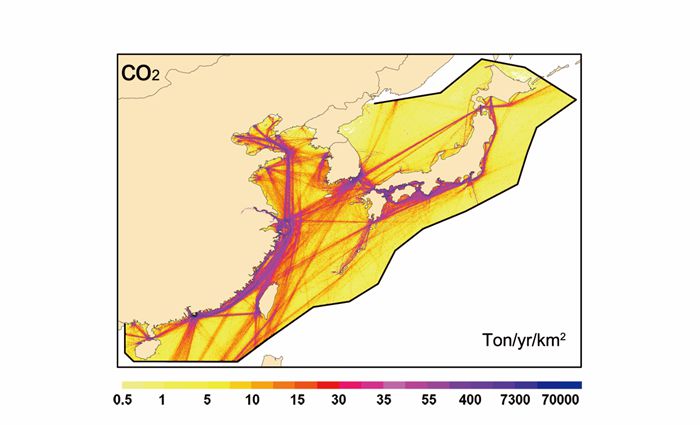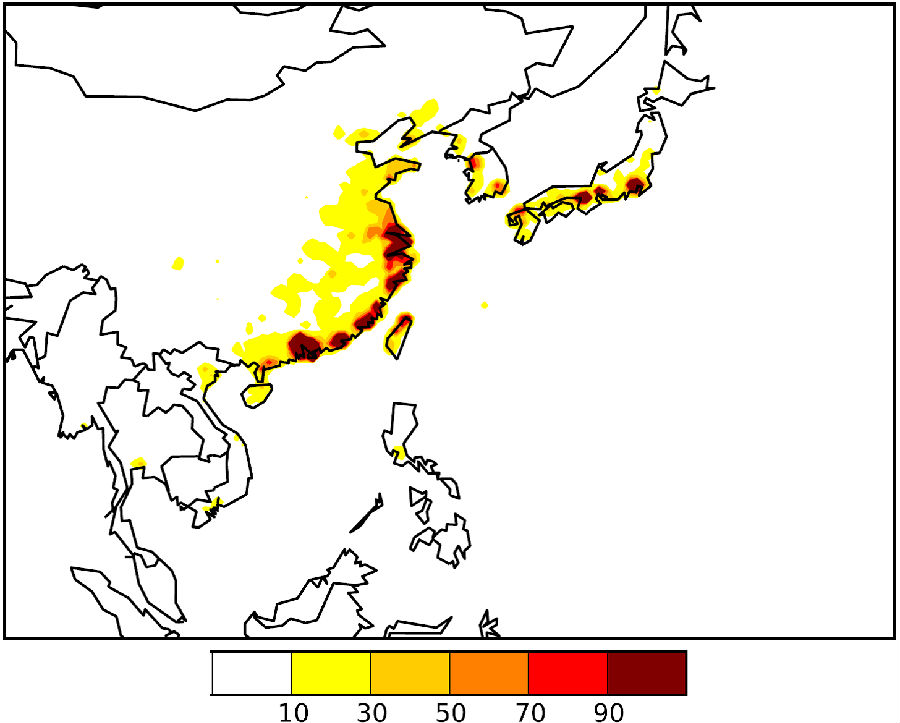SOE, Tsinghua July 19, 2016 Increased air pollution from shipping emissions in East Asia has contributed to tens of thousands of premature deaths each year in the region, and could have significant local and global climatic impacts, shows a new study published online this week in Nature Climate Change. Given that many vessels are registered outside of the region, the authors call for joint global efforts in order to reduce the impacts of emissions from sea-borne trade.
Many goods are made in East Asia, and are transported around the world by sea as the region is connected to nearly 40% of world sea-borne trade. Huan Liu, Drew Shindell, Kebin He and colleagues assess the climate and health impacts of greenhouse gas emissions and other air pollutants on local health and climate from this trade network. They use satellite data and observations of almost 19,000 vessels to track shipping movements in and around the region.

Spatial distribution of CO2 emissions from East Asian shipping.
The authors find that ship traffic in East Asia has more than doubled since 2005, and accounted for 16% of global shipping emissions of CO2 in 2013. The increased air pollution from this shipping activity accounts for approximately 14,500–37,500 premature deaths per year, and leads to short- and long-term changes in the climate system. The results show that controlling shipping emissions is important in order to both combat climate change and reduce the impacts of trade on local health.

Premature deaths per year attributable to East Asian shipping emissions in each 0.5 x 0.5 degree grid box.
In an accompanying News & Views, James Corbett notes: “The authors’ state-of-the-art methods and high-quality integration of satellite and terrestrial observations of ship activity represent an important contribution to recent global approaches, improving previous shipping health risk assessments in similar ways to European regional studies.” Several international medias have reported this new research.
Huan Liu, a young scholar in School of Environment, is the first and co-corresponding author for this study. Dr. Mingliang Fu, a post-doc research fellow, and two master students, Xinxin Jin and Yi Shang, are the co-authors of this paper. This work is supported by the Major Research Plan of the National Natural Science Foundation of China (Grant No. 91544110).
ARTICLE DETAILS
DOI: 10.1038/nclimate3083
Corresponding Authors:
Huan Liu
School of Environment, Tsinghua University, Beijing, China
Email: liu_env@tsinghua.edu.cn Tel: +86 106 277 1679
Kebin He
School of Environment, Tsinghua University, Beijing, China
Email: hekb@tsinghua.edu.cn
Drew Shindell
Duke University, Durham, North Carolina, United States
Email: drew.shindell@duke.edu Tel: +1 919 681 8467
News & Views Author:
James Corbett
University of Delaware, Newark, Delaware, United States
Email: jcorbett@udel.edu
Please link to the article in online versions of your report (the URL will go live after the embargo ends): http://nature.com/articles/doi:10.1038/nclimate3083